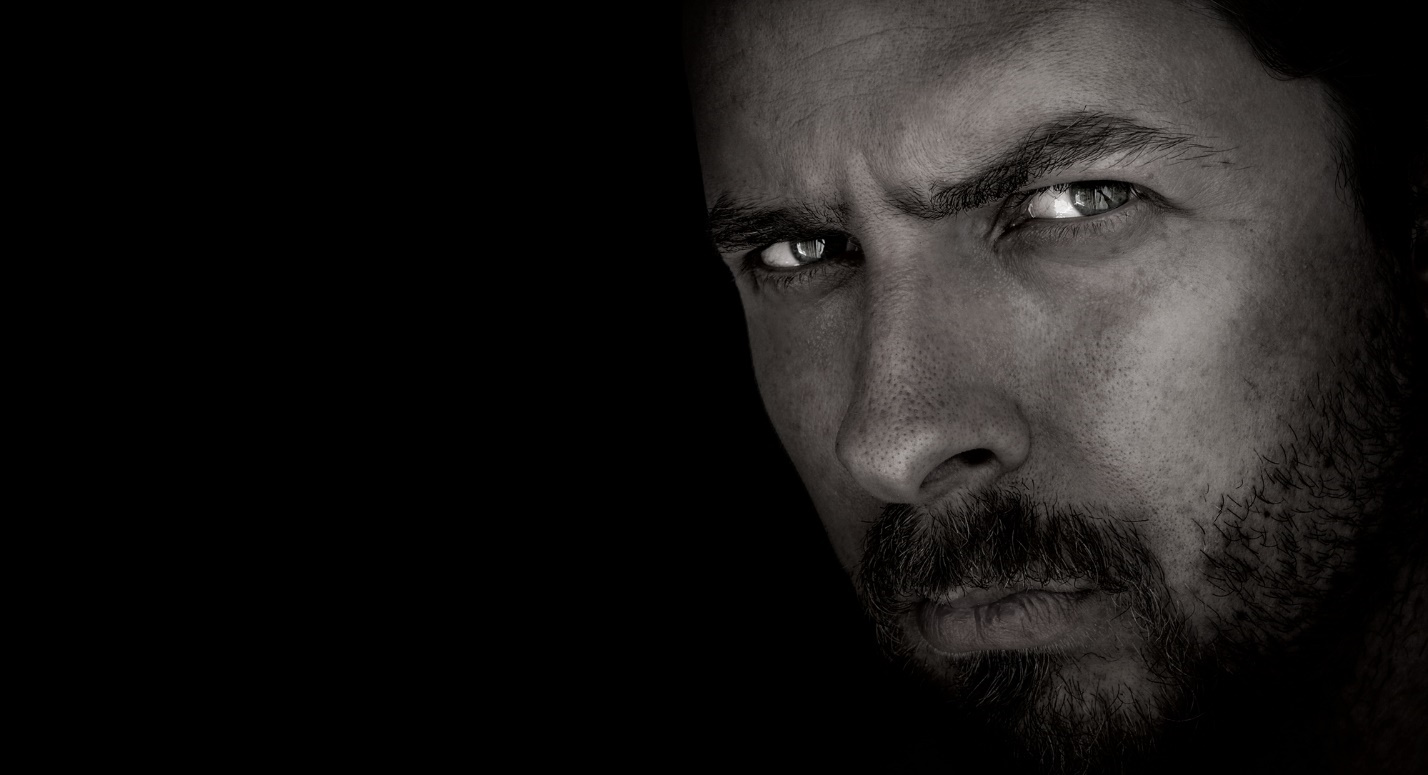BP46
I am coming to realize that hate resides in me.
I hate unpredictability. I hate authority. I hate being told what to do. I hate feeling powerless and small around people I experience as psychologically bigger than me.

I hate anger. But anger resides in me, so does that mean that I hate myself? The anger in me is far away, though, a distant echo of emotion, hidden at the end of a deep mine shaft. I don’t experience it directly.
What I do feel is anxiety in an obsessive kind of a way. Things have to be perfect. I have to be perfect. Sometimes I wonder if I’m controlling. If that’s true, I hate it. I’m doing to myself and others what he did to me—my father, that is. He was a controller.
Sometimes I feel more like a machine than a person until I react to something that comes out of nowhere.
I react to so many things.
I resist things. I’m a rebel. But I don’t rebel outwardly so much. Maybe I’m more passive in my resistance. I’ve always made it a practice to be a good person, but deep down inside I hear whispers of noncompliance. To be honest, far beneath my compliant crust, I’m defiant by nature and probably guilty of treason.
I squirm with anxiety and shame when my pastor raises his voice above a conversational volume during his sermon. I do not like being yelled at because a loud voice always makes me feel guilty, bad. I’m so terribly sensitive. I often tell myself to just get over it and not react to everything like I have third degree burns all over my heart. What is wrong with me, anyway?
Sometimes I do hate myself.
As I mentioned, I do not like correction. When I go into my boss’ office for my annual review, I feel like I’m being summoned into the principal’s office which I dreaded when I was in school. I remember I would get sick to my stomach whenever a teacher corrected me. I think some of my perfectionism came from trying to never make a mistake.
After all, if you’re perfect, no one will ever correct you, right? Then you don’t have to feel bad and sick.
Avoid correction. Avoid anger. Avoid conflict. Avoid faces that frown. Avoid raised voices. Why am I such an avoidant person?
Yes, I spend my life avoiding things, being perfect, obsessing about mistakes, controlling others so I never hear anything corrective from them, being outwardly compliant but inwardly defiant, wanting to be close to people but keeping everyone at a safe distance, trying to function emotionally in a narrow range but feeling hypersensitive to a look or a sigh and sensing rejection in every three-way conversation I have.
What is wrong with me?
Quite often, if I’m willing to be really honest, I don’t trust God. I may not even like Him. I try to be a good Christian by obeying Him and glorifying Him, but I feel like I’m beginning to slip away. I’m losing the grip on my faith a bit more every week—possibly every day. I can’t seem to stop the slow distancing. It does not even feel intentional. My heart is growing cooler toward Him. No, cold.

I hate His authority. He reminds me of my high school principal.
Where does God get off being so angry and authoritarian and controlling and rigid and unpredictable?
He sounds like my father.
My father was nice–sometimes. Yes, he even had a side to him that was fun. But he was so . . . irrational. Changeable. Moody. Reactive. Explosive. Hypersensitive. Hypervigilant. Personalizing. Above all, he was unpredictable.
When he got angry, he was scary. He went from zero to a hundred in 2.8 seconds. Faster than an open wheel race car at the Indianapolis 500.
I could never disagree with my father or talk back to him because he hated being challenged. Sometimes he could tolerate a different point of view—for a few seconds–but it was always touch and go with him. I never knew how he was going to react. Since I knew the intensity of his unpredictable anger so well, I learned to avoid being honest with him because peace was always better than awakening the dreadful giant.
I tried to avoid him, that is, but that is not always possible when you live in the same house. Whenever possible, I escaped to my friends’ houses, but that was difficult since we lived on a crop farm where my father grew corn and beans. The nearest neighbor was a mile away.
I signed up for every extracurricular activity at school so I would not have to return to the farm until the last activity bus. When I got home, I would shut myself in my room and do my homework.
The safest place for me on planet earth was outside playing along the creek that ran through our property. I would take Wilson, our beloved black lab, and disappear into the woods for hours at a time. Even in the dead of winter. Even when I was seven years old.
The supper table was the worst time of the day.
Around 5 pm, the house would begin to pulse with something that felt like static electricity. Dad was exhausted, irritable, and slightly altered by the two beers he always imbibed before the meal. He was a human land mine–one foolish word or unwise facial expression away from a total explosion. Mom was on edge because she had to be around my father for more than five minutes in one sitting.
All of us kids kept our elbows off the table and chewed with our mouths shut so the king of the house would not rap our fingers with his fork or order us to go straight to bed—without supper or brushing our teeth. Etiquette was always so important in our house. It took the place of intimacy and love.
After the evening meal, we had family devotions around the table. It was a grueling affair that lasted forever in my experience. Like some unholy trinity, God the Father became forever melded into one personality with my earthly father’s stern face and his deep, booming voice that rumbled forth out of the fire atop Mount Sinai before the giving of the Ten Commandments.
I remember as if it was yesterday sitting on the hard dining room chair staring at my father’s face as he read from the Old Testament. (He always favored the covenant written on stone over the one written on hearts.) Not looking at his face was always an egregious transgression. If he happened to glance up at us with his prison warden eyes and observed that we were staring at anything besides him or the Holy Book, there would be . . . heaven to pay. Or maybe, the other place. I just could never say hell in front of my father even if I was referring to the abode of the devil.
It was during these extended devotional times that I memorized the features of my father’s face forever—the lips that were a bit too pink, the furrowed forehead, the chiseled contours of his cheeks, the thinly whiskered face, and the movements of his tongue. I came to hate that tongue. I came to think of that tongue as a personified being with eyes that could watch me even as it spoke the words from the holy writ.

I often imagined a zipper closing his mouth. I think it was my passive aggressive way of having some power over him but still respecting him outwardly as a godly child should.
During those dreadful devotions, I heard very little of what my dad read—just enough to associate God’s word and character with my unsavory father who experienced everything as a slight against him. We had to respond exactly as he wished, or he would be offended.
There were frequent evenings around the supper table when I swear that he would search as if his life depended on it for something we were doing or even not doing to offend him. He always found some infraction in one of us and we immediately received the just recompense administered with holy wrath.
God seemed to always be on my father’s side. At least, in his perception.
When I was younger, my father was less psychological and more physical with his punishment.
I specifically feared my father’s spankings. They were impulsive acts, perpetrated in rage, long in endurance and severe in pain. In short, they were abusive. More than half the time, I had no clue why I was being punished. If you don’t know why you’re being punished, it’s impossible to learn how to avoid the punishment in the future.
He would also grab my ear and twist it when I had committed some sin of disrespect—or rap my head with his knuckles or occasionally pinch my arm so hard he left a bruise.
As I grew older, he administered less physical punishment and attempted to practice more control over my schedule and my activities—if I was in the house. If I was outside the house, I was free from the long arm of God’s righteously angry servant. So, naturally, I fled my father’s kingdom whenever possible and left my five siblings to do the chores around the farm.
I excelled instead at academics and sports. I think it was because I was always at school. I was a gym rat and the teacher’s pet. Hey, I was out to get whatever positive attention I could. My performance actually appeased my father who seemed to live through my achievements.
Occasionally, I heard him speaking of my accomplishments to his friends and his older brother. Not once, however, did I hear a word of encouragement directly to my face. He was not generous with praise. He was a withholding man.
As I moved through middle school and early high school, my body was always on edge. I often had stomach aches when I was inside the house or at school. Even though I went out of my way to befriend authority figures, I feared them all: teachers, principals, coaches, pastors, law enforcement, and–God.

On the outside, I was seen as a good kid, but on the inside, the roots of something dark and defiant were inching through the soil of my subterranean self. I was not even aware of this invisible growth. At least, not until I reached the bewitching hour at twenty-three years of age.
In many ways, everything took a turn for the better when my father abruptly left my mother and us kids for a woman he had met at a church retreat. Go figure. The sin of adultery that he had denounced almost as frequently and fiercely as the sin of premarital sex was the very transgression he chose to pursue.
Hypocrite.
Years later when I was in my early twenties, I married a spouse with an obsessive-compulsive personality whose anxiety manifested in the form of controlling everything, including me. It was not an angry, malicious control like that of my father, but it was similar enough to trigger me. A lot.
I increasingly grew to dislike my spouse. My underground reaction initially leaked out in the form of subtle resistance, passive aggressive behaviors, avoidance, hatred—all ways that gave me more control in the relationship.
As time went by and my spouse continued to trigger me, I began to get outwardly angry and bitter—me who had never been direct with an emotion in my whole life. I frequently lashed out, especially after work when we were together for supper. My spouse felt disrespected, unappreciated, and unheard.
Eventually, we both dared to voice the conviction that maybe we had married the wrong person.
Meanwhile, I stopped attending church when our pastor was in the middle of a series on the book of Exodus. I disliked what I experienced as an authoritarian preaching style, and I absolutely hated the harshness of God’s absolute holiness. He felt so transcendent, terrifying, and wrathful—ready to strike everyone dead for the slightest infraction.
I began drinking wine every night to calm my nerves. I stopped reading my Bible. I developed affections for someone at work who laughed a lot and appreciated everything I did and always made me feel so relaxed. This coworker was an agnostic who had no time for God but had lots of time for partying and harmless hookups.

One day when I accidentally referred to my spouse by the name of my secret emotional affair, I decided I needed to get help. Not because I wanted to save the marriage but because I wanted to figure out the best exit strategy to extricate myself from my controlling partner and grieve the deconstruction of my faith. I had already divorced the God I had once loved and now was preparing to divorce my spouse. I was losing two of the most important relationships in my life but gaining total freedom.
For six months, counseling worked for me. I increasingly accessed my deep anger for my spouse and grew in my conviction that I was justified in leaving. I was the good, healthy person in the marriage and my spouse was the bad, controlling one. My depression and anxiety began to lessen over time as I did the talk therapy and took the medication that had been prescribed for me. I was becoming so healthy!
Then came the fateful therapy session that every patient dreads.
My counselor asked me to talk about the farm and my father. I hesitated but finally obliged. I described my father as angry, controlling, unpredictable. I spoke about his nightly use of alcohol and how he had totally ruined our family by having an affair and leaving my mother. I was recalling how angry he was at the supper table, partially due to the influence of alcohol, when it struck me—the ballpeen hammer between the eyes: I was describing me!
I remember looking around frantically for a way out of my counselor’s office. I felt like I was in an escape room and had to find the exit. I even got to my feet to leave. My therapist convinced me that I had to stay and own the truth about me, or the therapeutic journey would be limited to blaming others for my problems—just like my father did. Ugh. I was trapped.
In the following months, I began to look inside at me instead of outside at others. I began to clean the inside of the cup as Jesus had instructed the hypocritical Pharisees. I grew in awareness of my control, hatred, and blaming. I also recognized the generational shame that had been passed down through my family for over a century. It reminded me of the creek that flowed through the farm property.
I learned that my spouse did indeed attempt to control others due to anxiety but that I was even more of a controller because of my buried anger and resentment and maybe even because I wanted to annihilate anyone who I perceived had authority over me—my pastor, my spouse and God. In short, I came to realize that the deconstruction of all my relationships was rooted in the psychological/relational dynamic known as transference.
I was transferring all my unresolved emotions from my relationship with my father onto everyone else in my current life—especially onto those who had some type of power over me. I subconsciously saw them as my father and reacted to them as I wished I could have reacted to him.
Projection may also have been a factor. I was seeing in my spouse and in God the very things I was doing and feeling: control and anger.
Shortly after I became aware of this transference phenomenon and my similarities to my father, I began couples counseling. It saved my marriage. The therapist did little to address my relationship with God, however, so I remained quite distant from Him.

I reasoned in my head that I did not need a counselor to help me address my relationship with God. I’ve thought about going back to church and talking with my pastor but something in me resists that. I remain in no-man’s-land spiritually. I have ceased the deconstruction of my faith, but I have not moved into a reconstruction phase either.
In my mind, God and my father remain one and the same person.
**
The narrator of this story is a composite of several actual people I have counseled in my practice over the years, both men and women. Unlike my first blog post about the deconstruction of faith that focused on the journey away from faith due to the attraction of physical pleasure, this post considers a different reason, namely, transference.
I believe God made fathers and mothers to point their children to Him. Deuteronomy 6 urges parents to teach their children to love the Lord God with all their heart, soul and might. Parents are to be the first God-presence for their children, exhibiting His character albeit in an imperfect way and teaching them how to pursue God.
How critical it is for mothers and fathers to be very aware that at the core of their parenting is the calling to act as divine representatives to their children. What a holy calling this is! The highest calling of a parent is to intentionally reveal God’s character through their own character and train their children to walk in the ways of Jesus.
It is a bit daunting to think about, but children will often grow up to see God similarly to how they see and experience their parents. If the father and mother are mature in their relationship with Jesus and portray the person of God in a healthy manner through holy living and teaching the truth of God’s word, their children will have a better chance of viewing God as desirable and true and will be more inclined to surrender their lives to Him.
If the opposite is true—if the parents represent God poorly through immature and unholy character like control, greed, unpredictable rage, shame, and unfaithfulness to their spouse—will not their children often assume that God is similar to their parents and turn their backs on such an undesirable personality? Will they not find such a God unsavory, disappointing, and even unloving and end up walking away from His presence?

So, parents, if you wish to portray an image of God that your children will find attractive and fragrant, walk like Jesus would. Be conveyors of love, peace, joy, consistency, and self-control. Be intentional about how you are present for them. Always identify and undo damaging transference and deadly projection in your life so you do not misrepresent God to your children. If you choose not to grow, you might end up being their personal Charon.
Children, if your parents did not offer you an attractive picture of Jesus’ character, know that it is still your responsibility to pursue your Creator and ask His help to remove every obstacle that might separate you from Him.
Don’t be like my uncle who handed his Bible to his mother when he was seventeen and told her he couldn’t do Christianity because her shaming, angry, unpredictable character was so intertwined with Jesus that he could never respect such a God. Fortunately, he did come back to Jesus—but not until he was 80 years old.
Work hard to resolve anything and everything that distorts your view of God even if it takes years of counseling with a pastor, mentor, or psychologist. Your friendship with Jesus is too eternally important to delay or to entirely avoid the hard work that brings growth and helps you identify the subterranean roots that run like adders through your heart.
In conclusion, be aware that the deconstruction of your faith may occur not only if you exchange God for idols of the flesh but also if you practice viewing God the Father through the filter of your immature, narcissistic, unpredictably angry father who planted the seeds of deep resentment in your heart. These seeds will not go away if you simply ignore them or engage in wishful thinking.
If you have thistles and thorns growing unchecked in the unattended garden of your heart, you must get down on your hands and knees and uproot them. If you ignore them, they will overgrow the beautiful garden of your heart and choke out all the fruit of the Spirit.

So, choose to clean the inside of the cup. Do not simply whitewash the outside of the tomb. Examine yourself to see if roots of bitterness and resentment run deep down into your heart. If you refuse to grow by design, you may very well become the person you dislike, or despise, or hate.
Deconstruction of your faith is a tragic thing. Avoid it at all costs by falling more deeply in love with Jesus and by recognizing and uprooting every factor that might compromise your faith in the Lover of your heart. Diligently practice His presence and He will change you from one degree of glory to another.
Therefore, as you received Christ Jesus the Lord, so walk in Him, rooted and built up in Him and established in the faith, just as you were taught, abounding in thanksgiving ~ Colossians 2:6-7
We destroy arguments and every lofty opinion raised against the knowledge of God, and take every thought captive to obey Christ ~ 2 Corinthians 10:5
Now when they saw the boldness of Peter and John, and perceived that they were uneducated men, they were astonished. And they recognized that they had been with Jesus ~ Acts 4:13
